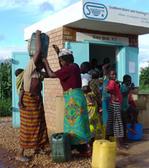Context
Compared to other countries in Southern Africa, Zambia is particularly rich in water. Despite this wealth, the human right to water and sanitation is not secured for a significant part of the population, in particular for low-income groups. Around 15 per cent of the urban population and 40 per cent of the rural population have no access to drinking water. The provision of sanitation services is also by no means adequate. This particularly affects suburban residential areas in the proximity of Zambia’s major cities. The ministry responsible for water does not work efficiently enough, which often results in a lack of transparency. The resources of the institutions involved also fail to meet the requirements. The level of training of skilled workers is insufficient. The curricula of training institutes for professions such as water operators, plumbers and electricians are outdated, as are the available teaching materials and tools. Instructors urgently require further training themselves. For these reasons, the systems for drinking water and sanitation cannot be thoroughly planned and constructed and cannot be operated in an economically efficient or and sustainable manner.
Objective
The prerequisites for transparent planning and implementation for ensuring water supply and sanitation as well as the conditions competence development of skilled workers in the water sector are improved.
Approach
The project supports its partners in the processes to improve the national and local water supply and sanitation. It focuses on strengthening the Ministry of Water in implementing the core processes for promoting transparency and accountability. Improved regional planning by the ministry will facilitate implementation in the districts. This applies, for instance, to gender-sensitive district investment plans. In addition, the project is working with four to six districts in the Luapula Province in northern Zambia on plans to improve the water supply and sanitation in rural areas, paying particular attention to the principles of nutrition and food security.
To supplement this, the project is implementing education and training measures in the water sector. Aiming to improve the quality of vocational education and training for future professionals, the project is revising training courses, training teaching staff and providing teaching material. The project also aims to increase the range of modular training courses on offer for experts. It plans to establish a steering group for vocational education and training in the water sector, which will regularly align the qualification requirements with the corresponding courses offered by vocational schools.
